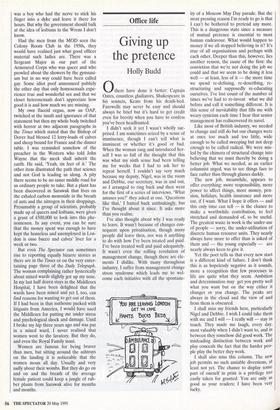Office life
Giving up the pretence
Holly Budd
0 thers have done it better: Captain Oates, countless gladiators, Shakespeare in his sonnets, Keats from his death-bed. Farewells may never be easy and should always be brief but it's hard to get credit even for brevity when you have to confess you've been headhunted.
I didn't seek it yet I wasn't wholly sur- prised. I am sometimes seized by a sense of imminence, though I can't tell what is imminent or whether it's good or bad. When the woman rang and introduced her- self I was so full of the thought that this was what my sixth sense had been telling me for weeks that I had to ask her to repeat herself. I couldn't say very much because my deputy, Nigel, was in the room and Debbie, our secretary, was in and out, so I arranged to ring back and then went for the first of a series of interviews. 'What amuses you?' they asked at one. 'Questions like that,' I batted back unthinkingly, but I've thought about it since. It asks more than you realise.
I've also thought about why I was ready to leave. It wasn't because of changes con- sequent upon privatisation, though many people did leave then, nor was it anything to do with how I've been treated and paid. I've been treated well and paid adequately. It wasn't even the rolling revolution of management change, though there are ele- ments I dislike. With many throughout industry, I suffer from management change stress syndrome which leads me to wel- come each initiative with all the spontane- ity of a Moscow May Day parade. But the most pressing reason I'm ready to go is that I can't be bothered to pretend any more. This is a dangerous state since a measure of mutual pretence is essential to most human endeavour. What would happen to money if we all stopped believing in it? It's true of all organisations and perhaps with each other. Deeper than this, however, lies another reason, the cause of the first: the conviction that we're not doing the job we could and that we seem to be doing it less well — at least, less of it — the more time we spend re-defining, re-describing, re- structuring and supposedly re-educating ourselves. I've lost count of the number of times we've had to re-invent what we did before and call it something different. It is this sense of inevitability that fills me with weary cynicism each time I hear that senior management has rediscovered its navel.
Like most of British industry, we needed to change and still do but our changes were at once too much and too little, wide enough to be called sweeping but not deep enough to be called radical. We were mis- led by the chimera of structural change into believing that we must thereby be doing a better job. What we needed, as an earlier columnist urged, was to see things face to face rather than through glasses darkly.
The new job, meanwhile, appears to offer everything: more responsibility, more power to affect things, more money, pen- sion, holidays, health insurance and more car, if I want. What I hope it offers — and this only time can tell — is the chance to make a worthwhile contribution, to feel stretched and demanded of, to be useful. The greatest waste in work is the under-use of people — sorry, the under-utilisation of discrete human resource units. They nearly always have more to offer than is asked of them and — the young especially — are nearly always keen to give it.
Yet the poet tells us that every new start is a different kind of failure. I don't think this is as hopelessly negative as it sounds, more a recognition that few processes in life are quite what they seem. Ambition and determination may get you pretty well what you want but on the way either it changes or you change. The peaks are always in the cloud and the view of and from them is obscured.
I shall miss my friends here, particularly Nigel and Debbie. I wish I could take them with me and I will — I really will — stay in touch. They made me laugh, every day, most valuably when I didn't want to, and in between they somehow did good work. The misleading distinction between work and play conceals the fact that the harder peo- ple play the better they work.
I shall also miss this column. The new job permits no such amiable diversions, at least not yet. The chance to display some part of oneself in print is a privilege too easily taken for granted. You are only as good as your readers; I have been very lucky.


































































 Previous page
Previous page